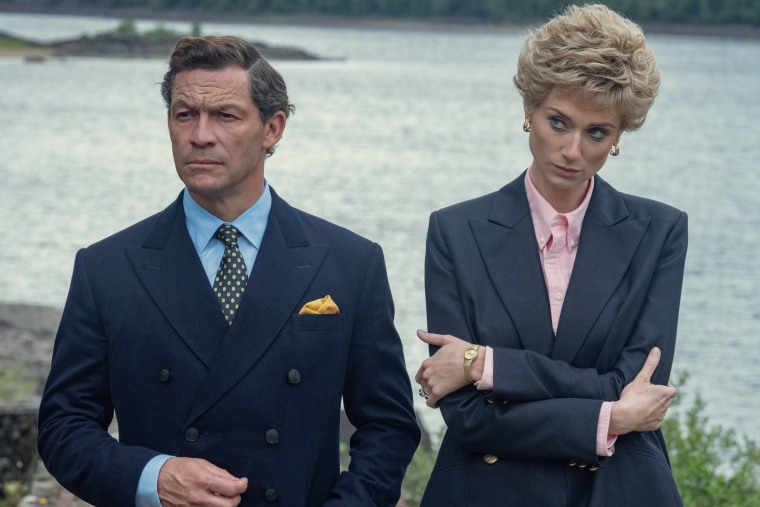The fifth season of Netflix’s superb, ambitious “The Crown” covers the years from 1988 to early 1997, arguably the nadir of England’s modern monarchy. It has already caused a bit of a royal firestorm, with the palace orchestrating a public campaign calling the new season grossly unfair to the new monarch, Charles III. This foolish choice, which did nothing but increase anticipation of the series, was unnecessary. Not only is the latest installment fantastic, but it is also the most sympathetic to Charles so far.
“The Crown” sets up series creator Peter Morgan to be a 21st- century Shakespeare for the Second Elizabethan era.
“The Crown” sets up series creator Peter Morgan to be a 21st-century Shakespeare for the Second Elizabethan era. His retellings of royal life are no more accurate than “Richard II” or “Henry V,” making royal whining all these years later all the sillier. Also like Shakespeare, Morgan began while Elizabeth was still on the throne, necessitating that the drama flatter her. The first four seasons accomplished this by turning Prince Philip into a cheating louche, Princess Margaret into a continual headache and Prince Charles into a spoiled whiner, as was necessary. Only Diana managed to fare well, with Emma Corrin’s performance of a woman constantly on the verge of a mental crisis eliciting unsurprising audience sympathy.
Morgan wrote season five to flatter Charles as much as it did his late mother, which now appears like a very prescient choice. Unlike his mother, however, Charles is not universally beloved. And it’s not a mystery as to why.
Welcome to the divorce years, as first Princess Anne (Claudia Harrison), then Prince Andrew (James Murray) and finally Charles (Dominic West) end their respective marriages. It’s all there: Anne debuting future husband “Tim” at the Royal Caledonian Ball, photographs of Andrew’s wife, Fergie, having her toes sucked, Charles and Camilla’s famous Tampongate conversation leak. As always, these scandals are framed around the queen (Imelda Staunton). She puzzles over why they cannot politely but firmly put probable royal mistresses in their place, as she does whenever Philip (Jonathan Pryce) seems to find one. But as Philip observes, it’s different for her — she’s the boss.
Staunton and Pryce are magnificent, quickly eclipsing previous versions. They go from out of touch to completely human and back in the blink of an eye as the consequences of their sequestered life become clear. The show brings back actor Claire Foy, who played a younger Queen Elizabeth, to pass to the torch to Staunton in the premiere, playing on their physical resemblance. Meanwhile, Pryce creates the most sympathetic Philip yet, as he seeks out opportunities for joy within the guardrails of his station.
But there are not enough superlatives to describe Elizabeth Debicki’s stunning performance as Diana. Once the royal separation occurs, she becomes a force to be reckoned with — a woman on a mission to bring down the monarchy. She is no longer a sympathetic flower crushed by the system but a woman out here making life choices, even as she unknowingly follows a path toward a tragic end.
The script strives to be evenhanded, suggesting Diana’s paranoia was justified and her every move watched by a palace “war room.” Neither is Charles demonized. Instead, he and Elizabeth are facing a monster of their own creation, borne of a decade of palace ignorance and neglect. Each side gets to tell its truth, from a certain point of view. Elizabeth, for example, lands a stinging rebuke when Diana announces that her (ultimately infamous) Martin Bashir interview will be airing soon. But the matriarch's reprimand sums up Diana's root complaint perfectly: “We are not your enemy. ... We don’t think about you at all.”
He and Elizabeth are facing a monster of their own creation, borne of a decade of palace ignorance and neglect.
Despite not looking a thing like him, West manages to embody Charles thoroughly, and his performance is as sympathetic as they come. Scenes where Charles pushes “The Sunday Times” to write articles telling Elizabeth to retire, or goes behind her back with various prime ministers, feel less like the machinations of a villain unable to wait his turn, and more like the actions of a man who feels like his life is wasting away in front of his eyes. The show also charitably dedicates episodes to Charles’ programs for impoverished youth, his environmentalism and his desire to force the monarchy into the 21st century.
“The Crown” even finds ways to make Charles a sympathetic figure in the divorce, no small feat. West portrays a royal whose self-image and ego prevent him from seeing beyond the confines of his birth. His ambitions are completely wrapped up in “being ready to be king.” Diana’s very suggestion that he might be happier actually living life is too outrageous to be considered. Even Camilla gets a sympathetic edit. As the only person who really gets Charles, she struggles to balance her perpetual “other woman” status and her family.
That’s not to say the season is perfect. In trying to delay Diana’s passing until the final season, the series spends a very uncomfortable hour building up Mohammed al-Fayed as a royals-obsessed weirdo. Lesley Manville gets only one episode to shine as Margaret before taking a back seat to odd digressions like whether Queen Mary should have saved the Romanovs from the slaughter. But it also has some glorious highlights, including the elegantly and creatively imagined divorce episode, and its very meta (and political) paean to the BBC.
All in all, “The Crown” may not be a carbon copy of history — but it remains incredibly entertaining and, ultimately, very sympathetic to its subjects, whether they deserve that sympathy or not. The palace — and its new king — would be wise to keep any complaints to themselves.
